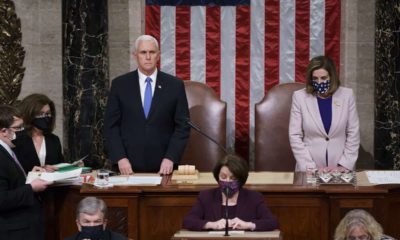Published
7 years agoon

Almost everyone got a tax break after passage of tax reform last month — including American farmers. But some farmers and co-ops got an inadvertent tax break — one with potentially damaging repercussions, according to the senators who worked on the section of the law at issue.

Taxpayers pick up the tab — twice. And in unanticipated ways.
One angle to this story that hasn’t received much attention is that the skewing of pricing signals caused by the 199A Deduction could result in higher motor fuels costs this summer.
This may sound off at first read, but another federal law — the Renewable Fuels Standard — mandates that a large percentage of the gasoline and diesel sold in the United States be at least partly renewable. Specifically, that it contain a certain percentage of renewables, such as ethanol in the case of gasoline and biodiesel in the case of diesel.
Both of these renewables are made from farm produce — corn (ethanol) and soybeans (biodiesel). The higher priced these are on the market — whether for natural, market-based reasons or due to artificial, government-created reasons — the more we pay for the end product.
With spring almost here and the summer driving season not far behind, there is more than theoretical worry about the possibility of fuel price spikes and the attendant harm on the broader economy that would result from it.
Another possible unwelcome outcome is that local food stores that aren’t co-ops will be artificially priced out of the market, costing local buyers in the form of higher priced co-op food — and local communities, in terms of jobs lost. Not everyone can afford to shop at the co-op.
In a market not artificially distorted by the tax code competition from lower-priced alternatives also serves to keep co-op prices within reason.
Republican Senators John Hoeven of North Dakota and John Thune of South Dakota have stated they never intended for the tax reform legislation they wrote to advantage or disadvantage anyone — farmers or co-ops or the general run of agricultural businesses — but rather to lower the tax burden across the board.

It did so by granting a 20% deduction of the gross amount sold to co-ops while only allowing a 20% net deduction if they sell to other-than-co-ops.
Whether this was inadvertent — or intentional — there is general agreement on both sides of the aisle that it was a mistake and that the tax break should be general, the same for all.
The easiest solution would be for Congress to simply change the language from gross to net for all concerned. That would achieve the aim of reducing taxes across-the-board, as the authors of the tax reform legislation intended — without tipping the scales in favor of some to the disadvantage of others, as was never intended.
About the Author
Eric Peters has covered the automobile industry since the ’90s and is the author of “Automotive Atrocities and Road Hogs.” His new book “Doomed” is scheduled for release next spring. He wrote this for InsideSources.com.


Biden Win Confirmed After Pro-Trump Mob Storms US Capitol


Congress Set to Confirm Biden’s Electoral Win Over Trump


Trump Allies Scrambling for Strategy to Overturn Biden Win


Final (!) Election Day: Georgia Deciding US Senate Control


Pelosi Likely Speaker Again, but Might Require High-Wire Act


COVID Relief Bill Morphs Into a Test of GOP Loyalty to Trump




